Journal of Charles Collins

Charles Collins records his thoughts and activities during his latter years as president of Dickinson College in Carlisle, Pennsylvania, and then as the head of State Female College in Memphis, Tennessee.


Charles Collins records his thoughts and activities during his latter years as president of Dickinson College in Carlisle, Pennsylvania, and then as the head of State Female College in Memphis, Tennessee.

Charles Collins records his thoughts and activities during the early years of his tenure as president of Dickinson College, Carlisle, Pennsylvania.
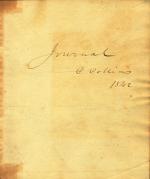
Charles Collins records his thoughts and activities from his time at Emory and Henry College in Emory, Virginia, to his years as president of Dickinson College in Carlisle, Pennsylvania, and then as the head of State Female College in Memphis, Ten

Horatio Collins King, a member of the Class of 1858, records his thoughts and activities of his daily life in the first year after his graduation from Dickinson College.

Alfred Brunson McCalmont, a member of the Class of 1844, writes daily entries about classes, social life at Dickinson College, and his life after graduation. McCalmont's entries start in October 1842 and conclude in January 1846.

Ulysses Hobbs records his thoughts and activities as a college student at Dickinson College.
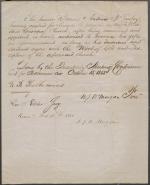

Rev. George Washington Bethune asks Isaac Waldron to also "come and see me" when he visits his mother. Bethune, a member of the Class of 1823, lives in Brooklyn, New York.

Henry Clay Dallam (Class of 1848) asks William Boyd Williams "to procure for me 'a literal translation of the Plays of Sophocles'" and to mail it to Dickinson.
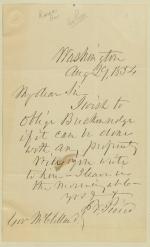

Charles Stinson (Class of 1845) writes to his father about his trip to Carlisle and starting classes at Dickinson. After meeting with President John Durbin, Stinson notes that the "conclusion is...

Henry Dallam (Class of 1848) writes W. Boyd Williams and describes starting classes at Dickinson. This experience marks "the first time I have been away from home for any length of time," as Dallam notes.
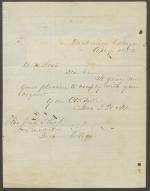
Jesse Peck, President of Dickinson College, responds to A. W. Foote's request for an autograph.

General Zachary Taylor writes to Roger Jones, the Adjutant General of the Army, regarding "Indian troubles on frontiers of Texas" and suggesting that the investigation into the Texas frontier "be made under the direction of the officer assigned to
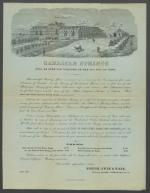
A printed advertisement for Carlisle Springs, which announces June 10, 1855 as the opening date and lists prices for board and horse keeping.

Albert Slape writes to James Munroe with news of the dismissal of four students on the charge of tarring Professor Henry Otis Tiffany's blackboard.

Thompson Prettyman Ege writes to his father, Oliver Ege, with updates on his life as a student and interactions with people in Carlisle.

Henry Martyn Harman writes to his father, Andrew Harman, about classes starting at Dickinson.

John Robert Kennaday writes to several members of his family about life as a student at Dickinson.

Samuel Henry Reynolds, a member of the Class of 1850, writes to his Mother about his health, conditions in Carlisle, and asks that his father send money for medicine.

Pennsylvania Supreme Court Chief Justice John B. Gibson writes to Mr. Johnson about changing the laws of Pennsylvania.

Former Secretary of War William Wilkins writes California Governor John Bigler to recommends Samuel A. Dickey, the son of Representative John Dickey, for a position or an appointment.

Attorney Murray Rush writes to Franklin Pierce, President of the United States, campaigning for the district attorney position in Philadelphia.

Former Dickinson College Professor Thomas Emory Sudler (Class of 1840) writes this letter to recommend a recent graduate, Martin T. Rohrer (Class of 1851), for a teaching position.

Dickinson College Professor Herman M. Johnson writes this letter to recommend a recent graduate, Martin T. Rohrer (Class of 1851), for a teaching position. Rohrer "is a young gentleman whom we believe to be...